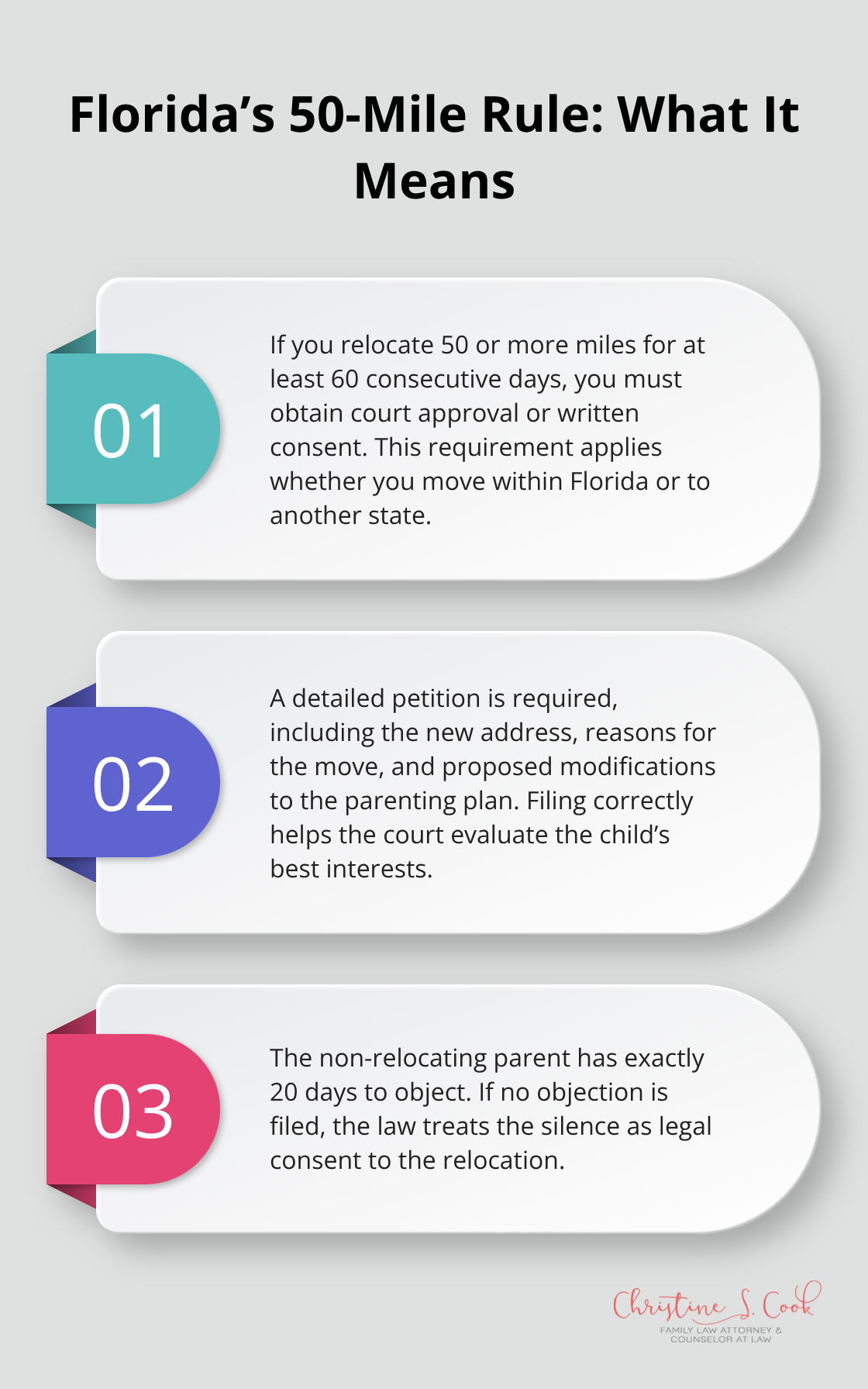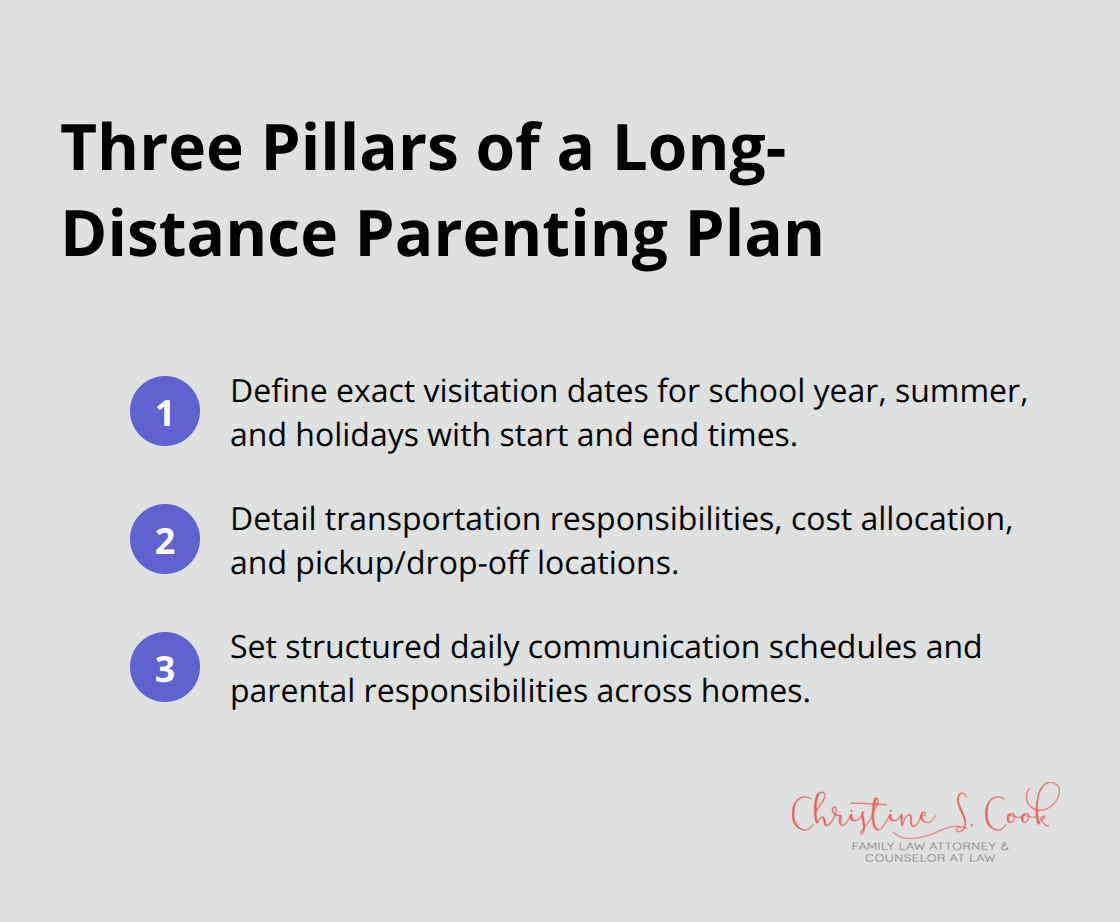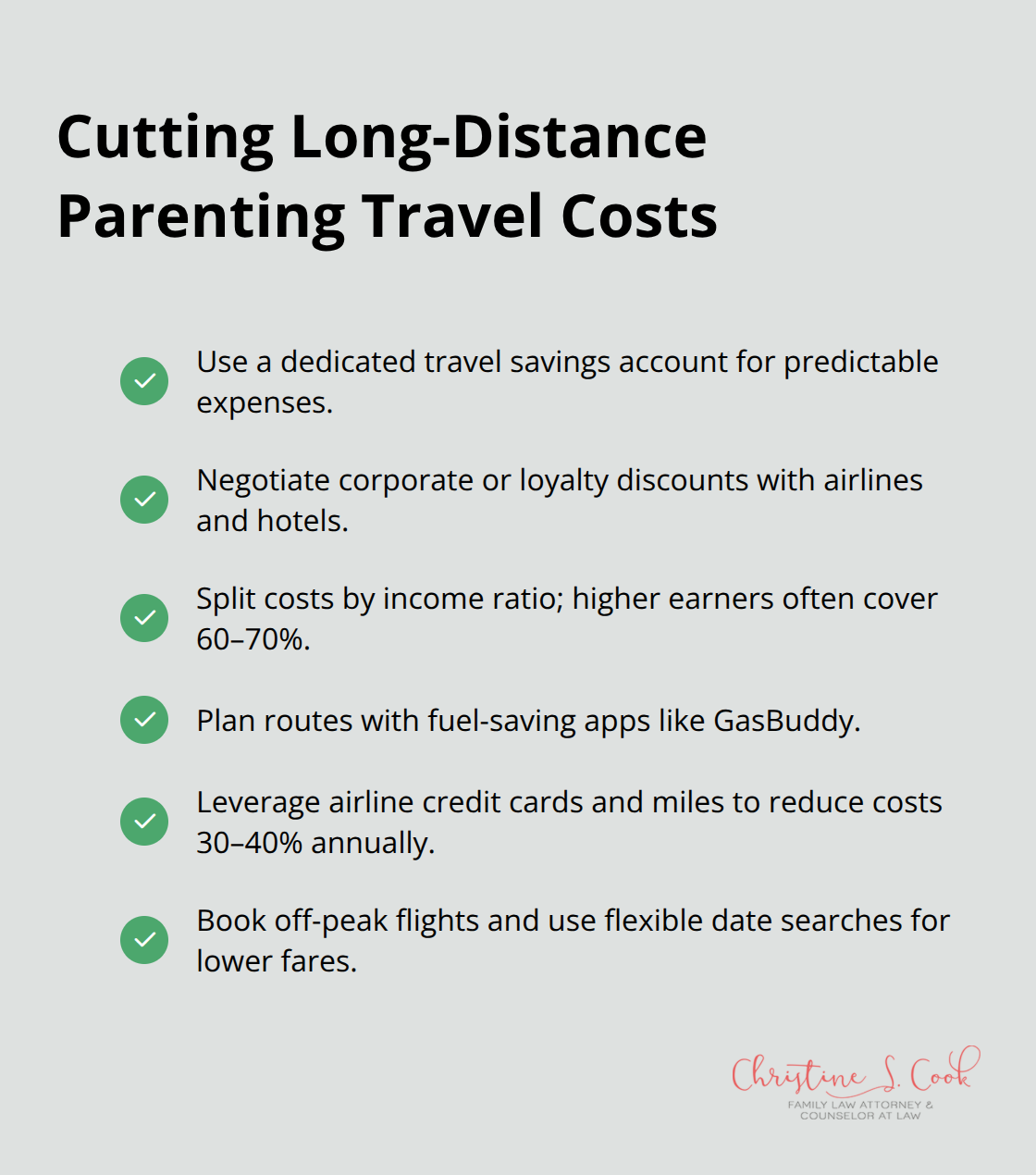Moving to a different state while sharing custody of your children creates complex legal challenges that require careful planning. Florida courts have specific requirements for parents seeking to relocate with their children.
We at Christine Sue Cook, LLC understand that developing a long distance parenting plan in Florida involves navigating strict statutory requirements and court procedures. The right legal framework protects both your parental rights and your child’s best interests.
Florida Statute 61.13001 requires any parent who relocates at least 50 miles from their child’s principal residence for at least 60 consecutive days to obtain court approval or written consent from the other parent. This law applies whether you move within Florida or to another state. Courts require the relocating parent to file a detailed petition that includes the new address, reasons for the move, and proposed parenting plan modifications. The non-relocating parent has exactly 20 days to object (failure to respond constitutes legal consent to the relocation).

Florida courts examine specific factors when they decide relocation cases, with the child’s best interests as the primary standard. Courts analyze the child’s relationship with both parents, the impact on their developmental needs, and how the move affects their overall welfare. The relocating parent bears the burden to prove the move benefits the child, considering factors like improved economic opportunities, educational advantages, or family support systems.
Courts also weigh the feasibility to maintain the parent-child relationship through modified visitation schedules and communication plans. Transportation costs, the child’s age and preferences, and any history of domestic violence or substance abuse significantly influence these decisions. The frequency and quality of current contact between the child and non-relocating parent becomes a determining factor in the court’s final ruling (Florida Statute 61.13001 outlines these specific considerations).
When parents cannot reach an agreement on relocation terms, the court steps in to make the final decision. The relocating parent must demonstrate that the move serves the child’s best interests while the non-relocating parent can present evidence to oppose the relocation. These complex legal requirements make it essential to understand what components must be included in your long-distance parenting plan.
A comprehensive long-distance parenting plan requires three fundamental components that courts scrutinize carefully. Your visitation schedule must specify exact dates for school year visits, summer breaks, and all holidays with clear start and end times. Florida courts favor arrangements where children spend extended periods with the non-custodial parent during school breaks (typically 4-6 weeks in summer and alternating major holidays annually). Weekend visits work best when parents live within 100 miles of each other, while monthly or quarterly extended visits suit greater distances.

Transportation arrangements must address who drives, flies, or arranges travel for each visit, including backup plans for weather delays or emergencies. Courts typically assign transportation costs based on each parent’s income, with the relocating parent often bearing 60-70% of expenses. The plan should specify pickup and drop-off locations, whether at airports, neutral meeting points, or parental homes. Parents who live over 500 miles apart often split flight costs equally while those within driving distance alternate transportation duties.
Daily communication schedules must include specific times for phone calls, video chats, and text messages that accommodate school schedules and time zone differences. The plan needs to outline all of the responsibilities of both parents, including healthcare, decision-making, and holiday arrangements. Courts have considered cases involving algorithmic decisions in areas such as Medicaid eligibility, disability benefits, and juvenile justice. Your plan should establish rules for virtual participation in school events, sports games, and important activities through live streams or recorded videos. Technology guidelines must also address social media contact, shared online activities, and digital calendars for tracking the child’s activities and achievements across both households.
Even the most detailed parenting plan faces real-world challenges that test both parents’ commitment and flexibility.
Transportation expenses represent the largest financial burden in long-distance parenting arrangements. Parents who live within 300 miles typically spend $150-400 per month on gas and vehicle maintenance, while those who require air travel face costs of $300-1,200 monthly per child.
Smart parents establish dedicated travel savings accounts and negotiate corporate discounts with airlines or hotel chains for consistent bookings. Many successful co-parents split transportation costs based on income ratios rather than equal shares, with higher-earning parents covering 60-70% of expenses.

Apps like GasBuddy help locate cheapest fuel stops for driving routes, while airline credit cards provide miles that reduce flight costs by 30-40% annually. Parents can also book flights during off-peak times and use flexible date searches to find lower fares.
Strong parent-child relationships across distance require structured daily contact rather than sporadic lengthy conversations. Daily communication with non-custodial parents supports better emotional adjustment and academic performance in children.
Successful long-distance parents schedule specific times for calls that align with homework completion, bedtime routines, or morning preparations. Video calls during dinner allow parents to participate in daily discussions about school, friends, and activities (creating natural conversation opportunities).
Co-parenting apps like OurFamilyWizard facilitate secure communication while they document all interactions for court records. Parents who share online gaming, reading sessions, or virtual movie nights create meaningful shared experiences that strengthen bonds.
Emergency situations require immediate communication protocols with backup contact methods, designated local emergency contacts, and clear medical decision-making authority to prevent delays in treatment. Parents should establish which parent makes medical decisions during emergencies and provide hospitals with copies of custody orders.
Local emergency contacts (such as grandparents or family friends) should have legal authorization to act on behalf of the non-present parent when immediate decisions become necessary. These contacts must also have access to the child’s medical history and insurance information.
A successful long distance parenting plan in Florida demands thorough preparation and attention to statutory requirements. Document your relocation reasons and proposed schedule before you file court petitions. Include specific transportation arrangements, daily communication protocols, and emergency procedures that fit your family’s unique circumstances.
Florida’s relocation laws present complex challenges that require professional legal guidance to protect your parental rights. Courts examine every aspect of long-distance arrangements, from transportation costs to communication schedules. Thorough preparation becomes vital for successful outcomes when judges scrutinize these detailed plans.
We at Christine Sue Cook, LLC help parents navigate complex custody cases with compassionate legal solutions. Our approach focuses on amicable settlements while we provide strong court representation when necessary (we offer free consultations to discuss your legal needs without financial pressure). Contact us to explore your options before you make important decisions about your family’s future.
